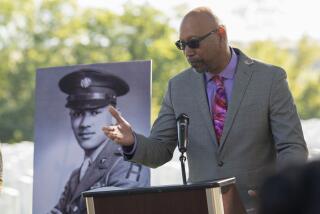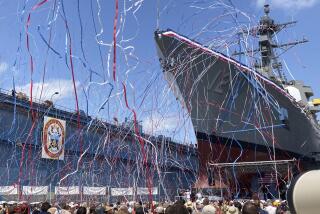Navy Will Honor Veteran’s Lifesaving World War II Action
- Share via
More than six decades after the fact, today the Navy will honor a World War II sailor for one of the most famous lifesaving acts of the war.
Retired Vice Adm. Michael L. Cowan will present a Navy Commendation medal to Retired Lt. Cmdr. Wheeler B. Lipes, who in 1942 performed an emergency appendectomy while serving aboard a submarine in the South China Sea.
Lipes was a hospital corpsman aboard the Seadragon when a fellow sailor suffered severe appendicitis.
Without a doctor on board and unable to surface for fear of drawing enemy fire, the sub’s commander gave Lipes permission to perform the two-hour operation with improvised equipment and no antibiotics.
The incident led to a Pulitzer Prize-winning story by Chicago Daily News reporter George Weller, who interviewed Lipes and other crew members after the sub returned to port in Australia.
The story, published in papers across the country, caused a sensation among Americans eager for uplifting news in the early stages of the war. Lipes gave speeches as part of the drive to sell U.S. war bonds and increase industrial productivity.
Hollywood used the appendicitis incident in the submarine movies “Destination Tokyo” and “Run Silent, Run Deep.” It was also the subject of a television documentary in the 1950s.
But the Navy never formally recognized Lipes, now 85, for saving the life of shipmate Darrell Dean Rector.
In fact, doctors who ran the Navy’s medical service during World War II were annoyed that Lipes had practiced medicine without a license.
In a 1999 interview with the Naval Historical Center, Lipes recounted that an official at the Bureau of Medicine and Surgery told him soon after the operation “how much trouble I had caused him.”
“There were many doctors back there [at the Navy Department in Washington] who were very upset about what I had done,” Lipes said. “I guess they were afraid that because I had performed an appendectomy, everyone in the fleet would be running around looking for the first opportunity to do one.”
Two years ago, Cowan -- who until recently was the Navy’s surgeon general -- heard of the Lipes incident and decided to correct the Navy’s oversight. Lipes’ resourcefulness, Cowan told a gathering of Navy doctors and corpsmen in San Diego, exemplified the kind of “can-do” spirit needed to provide emergency care for frontline personnel during the war in Iraq.
The chief of naval operations approved a medal for Lipes. But before it could be awarded, the former sailor was diagnosed with cancer.
So today, Cowan is scheduled to make the presentation to Lipes at the Naval Hospital at Camp Lejeune, near Lipes’ home in New Bern, N.C.
The commendation praises Lipes for his “resourcefulness and skillful and heroic surgical intervention under highly unfavorable conditions.”
Known as “Johnny” to his shipmates, Lipes, then 23, had observed appendectomies while working at a naval hospital. But the submarine had none of the required surgical instruments, and keeping the boat stable during the operation was a daunting task.
An inverted tea strainer was used as an anesthesia mask, with a sailor applying small drops of ether until Rector was unconscious. Spoons from the galley were modified to serve as retractors. For surgical gowns, Lipes and two assistants wore pajamas that had been boiled in water for sterilization.
Fumes from the ether permeated the tight quarters of the submarine, making sailors light-headed.
After removing the appendix, Lipes cauterized the stump with phenol -- used on submarines as an industrial cleaning solvent -- that was diluted with alcohol normally used to fuel torpedo motors.
Rector, 19, was able to return to duty within days.
Lipes retired from the Navy in 1962 and went on to become a hospital executive. Rector did not survive the war; he was aboard the submarine Tang when it was sunk in 1944 during an attack on a Japanese transport.
Although it is not unusual for veterans to petition for commendations and other recognition they believe they deserve, Lipes did none of that.
“What was important was that I did my job and saved the guy’s life,” Lipes said in the 1999 interview. “It was my job to do anything I could to preserve life, and really, I didn’t deserve special credit or recognition for doing that.”
More to Read
Sign up for Essential California
The most important California stories and recommendations in your inbox every morning.
You may occasionally receive promotional content from the Los Angeles Times.












